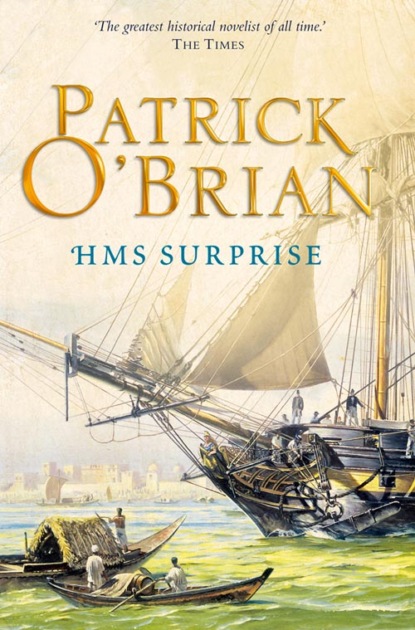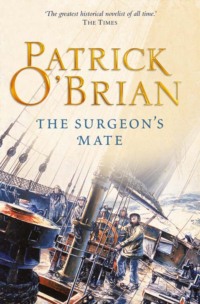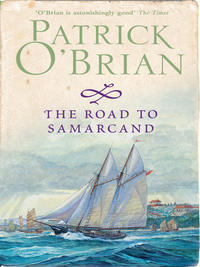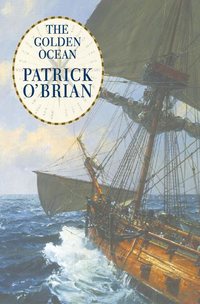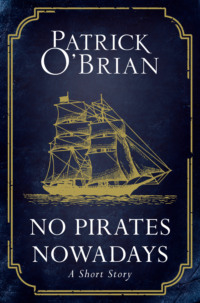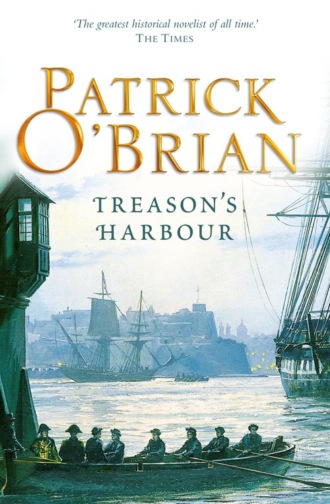
Полная версия
Treason’s Harbour

PATRICK O’BRIAN
Treason’s Harbour

Copyright
Published by HarperCollinsPublishers Ltd. 1 London Bridge Street London SE1 9GF www.harpercollins.co.uk
Copyright © Patrick O’Brian 1983
Copyright © Patrick O’Brian 1983
Patrick O’Brian asserts the moral right to be identified as the author of this work
All rights reserved under International and Pan-American Copyright Conventions. By payment of the required fees, you have been granted the non-exclusive, non-transferable right to access and read the text of this ebook on-screen. No part of this text may be reproduced, transmitted, down-loaded, decompiled, reverse engineered, or stored in or introduced into any information storage and retrieval system, in any form or by any means, whether electronic or mechanical, now known or hereinafter invented, without the express written permission of HarperCollins ebooks
Source ISBN: 9780006499237
Ebook Edition © 2011 ISBN: 9780007429356
Version: 2019-01-09
MARIAE SACRUM
‘Smoothe runnes the Water, where the Brooke is deepe. And in his simple shew he harbours Treason.’
2 HENRY VI
Contents
Cover
Title Page
Copyright
Epigraph
Diagram of a Square-Rigged Ship
Chapter One
Chapter Two
Chapter Three
Chapter Four
Chapter Five
Chapter Six
Chapter Seven
Chapter Eight
Chapter Nine
Chapter Ten
The Medical World of Dr Stephen Maturin - LOUIS JOLYON WEST
About the Author
The Works of Patrick O’Brian
About the Publisher
The sails of a square-rigged ship, hung out to dry in a calm.
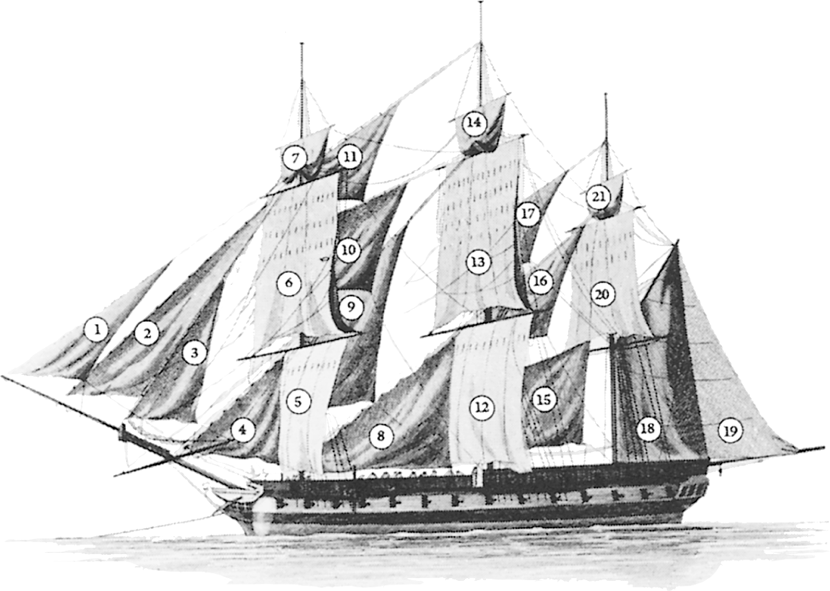
1 Flying jib
2 Jib
3 Fore topmast staysail
4 Fore staysail
5 Foresail, or course
6 Fore topsail
7 Fore topgallant
8 Mainstaysail
9 Main topmast staysail
10 Middle staysail
11 Main topgallant staysail
12 Mainsail, or course
13 Maintopsail
14 Main topgallant
15 Mizzen staysail
16 Mizzen topmast staysail
17 Mizzen topgallant staysail
18 Mizzen sail
19 Spanker
20 Mizzen topsail
21 Mizzen topgallant
Illustration source: Serres, Liber Nauticus. Courtesy of The Science and Technology Research Center, The New York Public Library, Astor, Lenox, and Tilden Foundation
Chapter One
A gentle breeze from the north-east after a night of rain, and the washed sky over Malta had a particular quality in its light that sharpened the lines of the noble buildings, bringing out all the virtue of the stone; the air too was a delight to breathe, and the city of Valletta was as cheerful as though it were fortunate in love or as though it had suddenly heard good news.
This was more than usually remarkable in a group of naval officers sitting in the bowered court of Searle’s hotel: to be sure, they looked out upon the arcaded Upper Baracca, filled with soldiers, sailors and civilians pacing slowly up and down in a sunlight so brilliant that it made even the black hoods the Maltese women wore look gay, while the officers’ uniforms shone like splendid flowers – a cosmopolitan crowd, for although most of the colour was the scarlet and gold of the British army many of the nations engaged in the war against Napoleon were represented and the shell-pink of Kresimir’s Croats, for example, made a charming contrast with the Neapolitan hussars’ silver-laced blue. And then beyond and below the Baracca there was the vast sweep of the Grand Harbour, pure sapphire today, flecked with the sails of countless small craft plying between Valletta and the great fortified headlands on the other side, St Angelo and Isola, and the men-of-war, the troopships and the victuallers, a sight to please any sailor’s heart.
Yet on the other hand all these gentlemen were captains without ships, a mumchance, melancholy class in general and even more so at this time, when the long, long war seemed to be working up to its climax, when competition was even stronger than before, and when distinction and worthwhile appointments, to say nothing of prize-money and promotion, depended on having a sea-going command. Some were absolutely shipless, either because their vessels had sunk under them, which was the case with Edward Long’s archaic Aeolus, or because promotion had set them ashore, or because an unfortunate court-martial had done the same. Most however were only grass-widowers; their ships, battered by years of blockading Toulon in all weathers, had been sent in for repair. But the dockyards were overcrowded, the repairs were often serious and far-reaching and always very slow, and here the captains had to sit while the precious sea-time ran by, cursing the delay. Some of the richer men had sent for their wives, who were no doubt a great comfort to them, but most were condemned to glum celibacy or to what local solace they could find. Captain Aubrey was one of these, for although he had recently captured a neat little prize in the Ionian Seas it had not yet been condemned in the Admiralty court and in any case his affairs were horribly involved at home, with legal difficulties of every kind; besides, accommodation in Malta had grown shockingly expensive and now that he was older he no longer dared lay out large sums that he did not yet possess; he therefore lived as a bachelor, as modestly as a post-captain decently could, up three pair of stairs at Searle’s, his only amusement being the opera. Indeed, he was perhaps the most unfortunate of those whose ships were in the repairers’ hands, for he had contrived to send no less than two separate vessels into dock, so that he had a double set of slow devious stupid corrupt incompetent officials, tradesmen and artificers to deal with: the first was the Worcester, a worn-out seventy-four-gun ship of the line that had very nearly come apart in a long, fruitless chase of the French fleet in dirty weather, and the second was the Surprise, a small, sweet-sailing frigate, a temporary command in which he had been sent to the Ionian while the Worcester was repairing and in which he had engaged two Turkish ships, the Torgud and the Kitabi, in an extremely violent action that had left the Torgud sinking, the Kitabi a prisoner and the Surprise full of holes between wind and water. The Worcester, that ill-conceived, ill-built coffinship, would have been much better broken up and sold for firewood; but it was upon her worthless, profitable hull that the dockyard spent all its slow creeping care, while the Surprise lay in limbo for want of a few midship knees, the starboard knighthead and bumkin, and twenty square yards of copper sheathing, while her crew, her once excellent crew of picked seamen, grew idle, dissolute, debauched, drunken and unhealthy, while some of the very best hands and even petty-officers were stolen from him by unscrupulous superiors and even his perfect first lieutenant left the ship.
Captain Aubrey should have been the gloomiest of a glum gathering, but in fact he had been rattling away, talking loud, and even singing, with such good will that his particular friend, the Surprise’s surgeon Stephen Maturin, had withdrawn to a quietor arbour, taking with him their temporary shipmate Professor Graham, a moral philosopher on leave from his Scottish university, an authority on the Turkish language and Eastern affairs in general. Captain Aubrey’s high spirits were caused partly by the beautiful day acting on a constitutionally cheerful nature, partly by the infectious merriment of his companions, but more, very much more, by the fact that at the farthest end of the table sat Thomas Pullings, until very recently his first lieutenant and now the most junior commander in the Navy, the very lowest of those entitled to be called captain, and that only by courtesy. The promotion had cost Mr Pullings some pints of blood and a surprisingly ugly wound – a glancing blow from a Turkish sabre had sliced off most of his forehead and nose – but he would willingly have suffered ten times the pain and disfigurement for the golden epaulettes that he kept glancing at with a secret smile, while his hand perpetually strayed to the one or to the other. It was a promotion that Jack Aubrey had worked for these many years, and one that he had almost despaired of achieving, for Pullings, though an eminent seaman, likeable and brave, had no advantages of person or birth: even on this occasion Aubrey had had no confidence that his dispatch would have the desired effect, since the Admiralty, always loth to promote, could take refuge in the excuse that the Torgud’s captain was a rebel and not the commander of a ship belonging to a hostile power. Yet the beautiful commission had come straight back, travelling in the Calliope and reaching Captain Pullings so short a time ago that he was still in his first amazed happiness, smiling, saying very little, answering at random, and suddenly laughing out loud with no apparent cause.
Dr Maturin too was fond of Thomas Pullings: like Captain Aubrey he had known him as midshipman, master’s mate and lieutenant; he esteemed him highly and had sewn back his nose and forehead with even more than his usual care, sitting by his cot night after night during his days of fever. But Dr Maturin had been baulked of his John Dory. This was Friday; he had been promised a John Dory and he had looked forward to it; but on Tuesday, Wednesday and Thursday the gregale had blown with such force that no fishing-boats had put out, and since Searle, unused to Catholic officers (rare birds in the Navy, where every lieutenant, on receiving his first commission, was required to renounce the Pope), had not even laid in any salt stock-fish, Maturin was obliged to dine on vegetables cooked in the English manner, waterlogged, tasteless, depressing. He was not ordinarily a greedy man, nor very ill-natured, but this disappointment had come on top of a series of vexations and some very grave anxieties, and on the second day of his giving up tobacco.
‘You might say that Duns Scotus stands in much the same relationship to Aquinas as Kant to Leibnitz,’ said Graham, carrying on their earlier conversation.
‘Sure, I have often heard the remark in Ballinasloe,’ said Maturin. ‘But I have no patience with Emmanuel Kant. Ever since I found him take such notice of that thief Rousseau, I have had no patience with him at all – for a philosopher to countenance that false ranting dog of a Swiss raparee shows either a criminal levity or a no less criminal gullibility. Gushing, carefully-calculated tears – false confidences, untrue confessions – enthusiasm – romantic vistas.’ His hand moved of itself to his cigar-case and came away disappointed. ‘How I hate enthusiasm and romantic vistas,’ he said.
‘Davy Hume was of your opinion,’ said Graham. ‘I mean with regard to Monsieur Rousseau. He found him to be little more than a crackit gaberlunzie.’
‘But at least Rousseau did not make a noise,’ said Maturin, looking angrily at his friends in the farther bower. ‘Jean-Jacques Rousseau may have been an apostate, a cold-hearted prevaricating fornicator, but he did not behave like a Bashan bull when he was merry. Will you look how they call out to those young women now, for shame?’
The young women, who nightly capered on the stage or lent their voices to the chorus, and who often accompanied the younger officers on their boating picnics to Gozo or Comino or their expeditions to what meagre groves the island had to offer, did not seem outraged: they called back and laughed and waved, and one of them, coming up the steps, poised herself for a moment on the arm of Captain Pellew’s chair, drank off his glass of wine, and told them they must all come to the opera on Saturday – she was to sing the part of the fifth gardener. At this Captain Aubrey made some amazingly witty remark: it was lost to Maturin, but the roar of laughter that followed must certainly have been heard in St Angelo.
‘Jesus, Mary and Joseph,’ said Maturin. ‘In Ireland I have known many a numerous gathering rejoice at little more than a genteel murmur; and it is to be supposed that the same applies to Scotland.’
Graham could suppose no such thing, but he was benevolently inclined towards Maturin and he said no more than ‘Heuch: ablins.’
‘Some of my best friends are Englishmen,’ continued Maturin. ‘Yet even the most valuable have this same vicious inclination to make a confused bellowing when they are happy. It is harmless enough in their own country, where the diet deadens the sensibilities, but it travels badly: it is perceived as a superabundancy of arrogance, and is resented more than many worse crimes. The Spaniard is a vile colonist, murderous, rapacious, cruel; but he is not heard to laugh. His arrogance is of a common, universal kind, and his presence is not resented in the same way as the Englishman’s. Take the case of this island alone: it is scarcely a decade since the Navy rescued the people from the horrible tyranny of the French and filled the place with wealth rather than carrying away the treasures of the churches by the shipload, but already there is a great and growing discontent and I believe the laughter has much to do with it. Though there is enough plain stupid arrogance to account for much of it, for all love. Will you look at this, now?’
Graham took the paper, held it at arm’s length, and read ‘The King’s Civil Commissioner observes with regret that some weak and inconsiderate persons, deceived under specious pretexts, have suffered themselves to become the instruments of a few turbulent and factious individuals. They have been seduced to subscribe a paper purporting to be an application to the King for certain changes in the existing form of government of these islands.’
‘There is Sir Hildebrand’s style in all its shining perfection,’ said Maturin. ‘Ebenezer Graham, you have his ear: could you not advise him to forget his pomp, his righteous indignation, for a moment and reflect upon the immense importance of Maltese good will? Could you not persuade him to address them with common civility and in their own language, or at least in Italian? Could you not … what is it, child?’ he said, breaking off to attend to a little boy who had slipped through the greenery and who was standing at his side, smiling shyly, waiting to say that his sister – fifteen years of age, no more, my lord – was kind to English gentlemen: her fees were astonishingly moderate, and full satisfaction was guaranteed.
It was not much of an interruption, but it broke Maturin’s flow of speech, and when the boy had gone Graham observed, ‘For your part, you have Captain Aubrey’s ear. Could you not advise him to avoid Mr Holden’s company, rather than hail him in that public manner?’
Mr Holden had been dismissed the service for using his ship to protect some Greeks fleeing from a Turkish punitive expedition: he was now acting for a small, remote, ineffectual and premature Committee for Greek Independence, and since the English government had to keep on terms with the Sublime Porte he was a most unwelcome visitor to official Malta.
The advice, of course, was far too late. Holden was already sitting at his old shipmate’s table, one hand holding a glass of wine, the other stretched out, pointing at a singularly magnificent diamond spray in Jack Aubrey’s hat. ‘What, what is that?’ he cried.
‘It is a chelengk,’ said Jack with some complacency. ‘Ain’t I elegant?’
‘Wind it up again. Wind it up for him,’ said his friends, and the Captain set his hat, his best, gold-laced, number one full-dress scraper, on the table: the splendid bauble – two close-packed lines of small diamonds, each topped by a respectable stone and each four or five inches long – had a round, diamond-studded base; this he twisted anti-clockwise for several turns, and as he put on his hat again the chelengk sprang into motion, the round turning with a gentle whirr and the sprays quivering with a life of their own, so that Captain Aubrey sat in a small private coruscation, a confidential prismatic firework display, astonishingly brilliant in the sun.
‘Where, where did he get it?’ cried Holden, turning to the others, as though Captain Aubrey might not be addressed while the chelengk blazed and trembled.
Did Holden not know? – Why, from the Grand Signior, of course, the Sultan of Turkey – For taking the rebellious Torgud and her consort – Where had Holden been, not to have heard of the action between the Surprise and the Torgud, the neatest action this last age?
‘I knew the Torgud, of course,’ said Holden. ‘She carried very heavy metal, and she was commanded by that murderous bloody-minded dog Mustapha Bey. Pray, Jack, how did you set about her?’
‘Well, we were just opening the Corfu channel, do you see, with a steady topgallant breeze at south-east,’ said Jack. ‘And the ships lay thus…’
In the quieter, more philosophic bower Dr Maturin, sitting with his legs crossed and his breeches unbuckled at the knee, felt a slight movement upon his calf, as of an insect or the like: instinctively he raised his hand, but years of natural philosophy – of a desire to know just what the creature was, and a wish to spare the honey-bee or the innocent resting moth – delayed the stroke. He had often paid for his knowledge in the past, and now he paid for it again: he had scarcely recognized the great twelve-spotted Maltese horse-fly before it thrust its proboscis deep into his flesh. He struck, crushed the brute, and sat watching the blood spread on his white silk stocking, his lips moving in silent rage.
Graham said, ‘You were speaking of your freedom from tobacco: but should we not consider a determination not to smoke as an even greater deprivation of liberty? As an abolition of the right of present choice, which is freedom’s very essence? Should not a wise man feel himself free to smoke tobacco or not to smoke tobacco, as the occasion requires? We are social animals; but by ill-timed austerities, that lead to moroseness, we may be led to forget our social duties, and so loosen the bonds of society.’
‘I am sure that you mean kindly in speaking so,’ said Maturin. ‘Yet you must allow me to say that I wonder at it – I wonder that a man of your parts should believe in a simple, single cause for so complex an effect as a state of mind. Is it conceivable that mere absence of tobacco alone could make me testy? No, no: in psychology as in history we must look for multiple causality. I shall smoke a small cigar, or part of a small cigar, out of compliment to you; but you will see that the difference, if it exists at all, is very slight. Indeed, the springs of mood are wonderfully obscure, and sometimes I am astonished at what I find welling up from them – at the thoughts and attitudes that present themselves, fully formed, before the mental eye.’
It was quite true. The John Dory and the yearning for tobacco were not enough to account for Maturin’s ill-temper, which in any case had lasted for some days, surprising him as he woke each morning. As he pondered it suddenly occurred to him that at least one of the many reasons was the fact that he was sexually starved and that recently his amorous propensities had been stirred. ‘The bull, confined, grows vicious,’ he observed to himself, drawing the grateful smoke deep into his lungs: but that was not a full explanation, by any means. He moved out into the sun, to the leeward side of the arbour, so that he should not fumigate Professor Graham; and there, blinking in the strong light, he turned the matter over in his mind.
His move brought him into sight from the Apothecary’s Tower, a tall, severe building with an incongruous clock in its forehead. Its gaunt, unfurnished topmost room had not been occupied since the time of the Knights; the floor was coated with soft grey dust and bat-dung, and in the dim rafters high overhead the bats themselves could be heard moving about, while all the time the clock ticked away the seconds in a deep, resonating tone. It was a cheerless, inimical room, yet it provided watchers with a fine view of the Baracca, of Searle’s hotel and of its courtyard, though not, obviously, of its covered bowers. ‘There is one of them,’ said the first watcher. ‘He has just moved into the sun.’
‘The naval surgeon, smoking a cigar?’ asked the second.
‘He is a naval surgeon, and a very clever one, they say; but he is also an intelligence-agent. His name is Maturin, Stephen Maturin: Irish father, Spanish mother – can pass for either; or for French. He has done a great deal of damage; he has been the direct cause of many of our people’s death and he was aboard the Ocean when your cousin was poisoned.’
‘I shall deal with him tonight.’
‘You will do nothing of the kind,’ said the first man sharply. His Italian had a strong southern accent, but he was in fact a French agent, one of the most important French agents in the Mediterranean, and the Maltese with him bowed submissively. Lesueur was the Frenchman’s name and he was not unlike a somewhat older version of the Dr Maturin whose face he was now examining so attentively with a pocket spy-glass – a slight man of under the middle height, sallow, stooping, bookish, with an habitually closed, reserved expression, a man who would rarely draw attention but who having drawn it would give the impression of more than usual self-possession and intelligence: and Lesueur also had the easy authority of one with great sums of money at his command. He was dressed as a fairly prosperous merchant. ‘No, no, Giuseppe,’ he said more kindly, ‘I commend your zeal, and I know you are an excellent hand with a knife; but this is not Naples, nor even Rome. His abrupt, unexplained disappearance would make a great deal of noise – the implications would be obvious, and it is absolutely essential that our existence should not be suspected. In any event there is little to be learnt from a corpse, whereas the living Dr Maturin may supply us with a great deal of information. I have set Mrs Fielding on him, and you and Luigi will watch his other meetings with the greatest care.’
‘Who is Mrs Fielding?’
‘A lady who works for us: she reports directly to me or Carlos.’ He might have added that Laura Fielding was a Neapolitan married to a lieutenant in the Royal Navy, a young man who had been captured by the French during a cutting-out expedition and who was now confined in the punishment-prison of Bitche for having escaped from Verdun; and as he had killed one of the gendarmes who were pursuing him it was likely that he would be condemned to death when his trial came on. But the trial was postponed again and again, and by an exceedingly roundabout route Mrs Fielding was told that it might be postponed indefinitely if she would cooperate with a person who was interested in the movements of shipping. The matter was put to her as having to do with international insurance – with great Venetian and Genoese firms whose French correspondents had the government’s ear. The story might not have answered with anyone thoroughly accustomed to business, but the man who told it was a convincing speaker and he produced a perfectly authentic letter written by Mr Fielding to his wife not three weeks before, a letter in which he spoke of ‘this exceptional opportunity to send his love and to tell his dearest Laura that the trial had been put off again – his confinement was now much less severe, and it seemed possible that the charges might not be pressed with the utmost rigour’.


